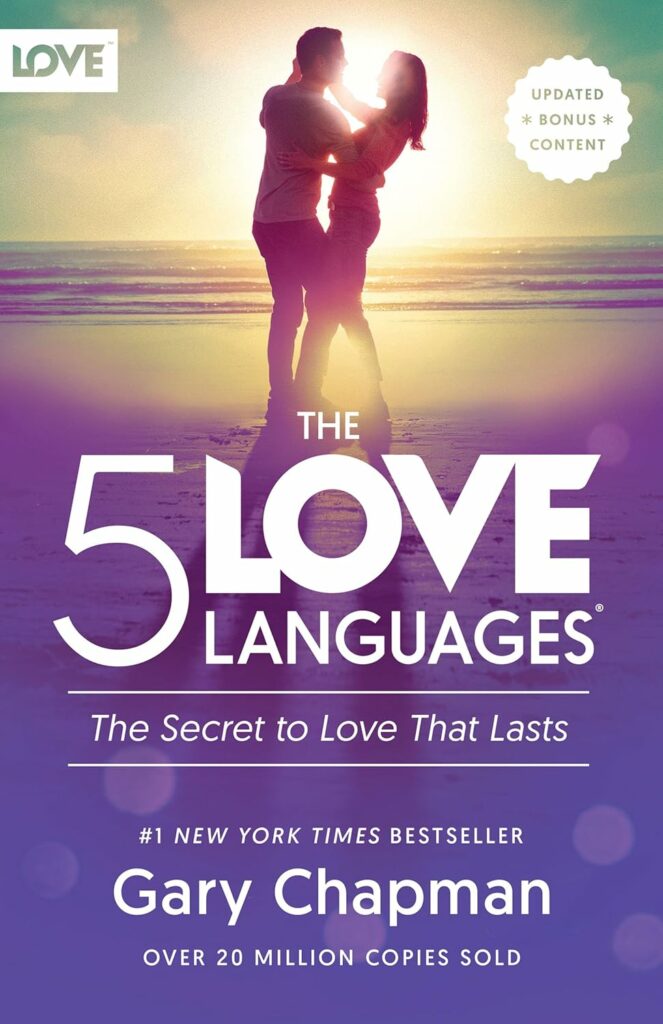
What Is the Language of Love? A Heartfelt Exploration: Discovering the Secrets to Deeper Connections
Picture this: You’re pouring your heart into a grand romantic gesture—flowers, chocolates, the whole nine yards—only to have your partner casually say, “Oh, thanks,” while scrolling through their phone. Ouch, right? It’s not that they don’t care; it might just be that you’re speaking a different “language of love.” So, What is the Language of Love exactly, and why does it seem like we’re sometimes speaking in code when it comes to romance?
In this blog, we’ll unravel the concept of love languages, made famous by Dr. Gary Chapman’s book The 5 Love Languages: The Secret to Love That Lasts. From understanding your own language to learning how to decode your partner’s, we’ll dive deep into this powerful tool for improving relationships—with a dash of humor along the way.
The 5 Love Languages: The Secret to Love that Lasts Paperback

- Hardcover $13.82
- Paperback $8.99
- Kindle $8.54
- Audio Book $.99 with membership
Understanding the Five Love Languages
Dr. Chapman’s theory proposes that everyone expresses and receives love in five primary ways, which he calls the love languages. Think of these as your romantic dialects—understanding them can turn your relationship from “lost in translation” to “perfect harmony.”
- Words of Affirmation
For people who value this love language, compliments and verbal encouragement are everything. A simple “You look amazing today” or “I’m so proud of you” can go a long way. But beware: insincere flattery won’t cut it. If this is your partner’s love language, start practicing your Shakespearean sonnets (or at least learn to text a thoughtful “good morning”). - Acts of Service
Love isn’t just about saying it; sometimes, it’s about doing it. Acts of service folks appreciate actions over words. Cooking dinner, doing the laundry, or fixing that squeaky door hinge can make their heart flutter faster than a candlelit dinner. - Receiving Gifts
No, it’s not about materialism—it’s about thoughtfulness. People with this language feel loved when you give them meaningful tokens, whether it’s a handwritten note or their favorite candy bar. Remember, it’s the thought that counts, so put a little heart into it. - Quality Time
If this is your partner’s love language, they crave your undivided attention. That means putting your phone down, maintaining eye contact, and maybe even watching their favorite (terrible) TV show together. Yes, even if it’s reality dating shows. - Physical Touch
Sometimes love is best expressed through a hug, a kiss, or a cuddle on the couch. People with this love language thrive on physical closeness, so be prepared for lots of hand-holding and back rubs.
What Is the Language of Love? Why It Matters in Relationships
Now that we know the five love languages, let’s tackle the big question: Why does it matter? Relationships thrive on connection, and understanding each other’s love language is like having the ultimate translation guide. Imagine trying to tell someone you love them in French when they only speak Italian—it’s not going to land the way you want it to.
When you know your partner’s love language, you can communicate affection in a way that resonates with them. Even better, when they understand yours, you’ll feel more appreciated, understood, and, well, loved.
But here’s the kicker: most people naturally express love in their own language, not their partner’s. That’s why you might be showering your partner with compliments (words of affirmation) while they’re silently wishing you’d just take out the trash (acts of service). Understanding and speaking their language bridges that gap.

Discovering Yours (and Theirs)
The easiest way to find out your love language? Take the official quiz! But if you’re looking for a quick cheat sheet, think about what makes you feel most appreciated. Do you light up when your partner says “I love you,” or does a surprise coffee delivery make your day?
Here are a few clues to help decode love languages:
- If you’re constantly giving compliments, you might value words of affirmation.
- If you’re always running errands for your partner, you might lean toward acts of service.
- If you’re a hugger, physical touch could be your jam.
- If you cherish those long talks, quality time might be your thing.
- And if you’re the type to pick out the perfect gift for every occasion, receiving gifts could be your language.
What Is the Language of Love? Tips for Applying It in Your Relationship
- Communicate Openly
Sit down with your partner and talk about your love languages. Share what makes you feel loved and listen to what matters to them. Think of it as creating a relationship cheat sheet. - Adapt and Adjust
If your partner’s love language isn’t natural for you, don’t panic! You don’t have to become a pro overnight. Small efforts, like leaving a heartfelt note or offering a warm hug, can make a big difference. - Be Observant
If your partner hasn’t explicitly told you their language, pay attention to how they express love. Chances are, their language shows up in how they treat you. - Practice Regularly
Love languages aren’t a one-and-done deal—they’re a lifelong commitment. Make an effort to “speak” your partner’s language regularly. Relationships need maintenance, just like your Netflix subscription (and we know you never forget to renew that).
Why Humor Is the Ultimate Love Language
While Dr. Chapman didn’t officially include humor as a love language, it deserves an honorary spot. Laughing together can diffuse tension, deepen your bond, and make even the toughest days a little brighter. So, don’t forget to crack a joke, share a meme, or have a tickle fight now and then. Love may be serious business, but that doesn’t mean it can’t be fun.
In Conclusion: What Is the Language of Love? It’s All About Connection
Understanding the language of love is like finding the Rosetta Stone for your relationship. It helps you connect on a deeper level, appreciate each other’s efforts, and avoid the common pitfalls of miscommunication. Whether your language is quality time or acts of service, the key is to embrace it and use it as a tool to strengthen your bond.
So the next time your partner folds the laundry, brings you coffee, or writes you a cheesy love note, don’t just thank them—love them in their language too. And if all else fails, remember: humor is the universal love language.
Now go forth and love fluently!




The article offers an insightful overview of Dr. Gary Chapman’s “5 Love Languages,” which helps individuals better understand how to express affection in relationships. It emphasizes the importance of recognizing and adapting to each other’s love language—whether it’s words of affirmation, acts of service, receiving gifts, quality time, or physical touch. By learning to speak your partner’s love language, you can enhance connection and avoid miscommunication. The piece encourages practical steps for improving relationships, making it a useful guide for fostering deeper emotional bonds.
Thank you Slavisa! Make sure you bookmark us, and be sure to stay in touch. Thank you for your valuable time.
What a delightful and insightful blog! It beautifully breaks down the concept of love languages with humor and heart, making it so easy to relate to. I love how it emphasizes the importance of understanding not just your own love language but also your partner’s—like finding the perfect “translation” for love! Plus, the tips are practical and fun, and the nod to humor as the unofficial sixth love language is such a sweet touch. A great read for anyone looking to deepen their connections!
Thank you so much for the kind words Herman! I appreciate that so much. Please spread the word about Us, and don’t forget to bookmark are site because there is so much more valuable information to come!